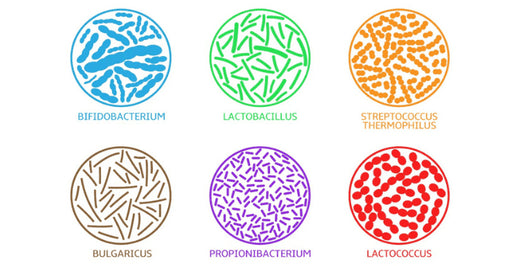Your Cart is Empty
Shipping is free on orders over €60!
Shipping is free on orders over €60!

Probiotics represent a fascinating field of science that has the potential to improve health and wellbeing.
Although research is still ongoing, a lot of evidence suggests that including probiotics in our diets can provide a range of health benefits.
As awareness of the importance of gut flora increases, probiotics are becoming increasingly popular and their use in everyday life can have a positive impact on our health.
Probiotics, which are live microorganisms that provide great health benefits, have been used for a long time.
Their roots go back to ancient times, when people fermented foods to extend their shelf life and improve their taste.
For example, yogurt and sauerkraut are traditional foods that contain probiotic cultures. (1)
The modern concept of probiotics began to emerge in the early 20th century, when Russian scientist and Nobel Prize winner Elie Metchnikoff first introduced the concept that the gut flora could be altered and harmful microbes replaced with beneficial ones to help health.
In 2001, probiotics were defined as “live microorganisms that, in sufficient quantities, provide health benefits to the host.” (2)
In recent decades, probiotics have become the subject of intense research.
Many studies have examined their effects on gut health, the immune system, and overall digestive health.
For example, meta-analyses have shown that probiotics can help treat and prevent various digestive disorders. (3)
Probiotics are often recommended for diarrhea caused by antibiotics or viral infections.
Certain strains of probiotics show positive effects in relieving the symptoms of irritable bowel syndrome.
Probiotics may help maintain remission in patients with inflammatory bowel disease.
Recent research suggests that probiotics may also affect mental health and even metabolism, suggesting a gut-brain connection. (2)
Probiotics help maintain the balance of “good” and “bad” bacteria in the gut, which may improve digestion and reduce the risk of infection. They also maintain healthy gut flora, support the immune system, and may help protect the body from disease.
Probiotics are also being studied in the context of skin health, where they may help with skin problems such as acne or eczema. (1)
Probiotics can be obtained from various sources via fermented foods such as yogurt, kefir, sauerkraut, kimchi, and tempeh.
Today, there are various probiotic supplements available that contain specific strains of bacteria. Before using, it is advisable to consult a doctor or nutritionist.
To get the most benefit from probiotics, it is important to eat a balanced, fiber-rich diet that supports the growth of probiotic cultures in the gut. (3)
Probiotic cultures play a key role in maintaining gut and body health.
Each of the strains mentioned has its own specific properties and positive effects on the organism, and their inclusion in the diet can bring a number of health benefits. (3)
It is important to select high-quality probiotic sources and consider individual needs and health status. You can try our own probiotic complex for healthy digestion and absorption.
Thanks for reading,
Your Kratom World